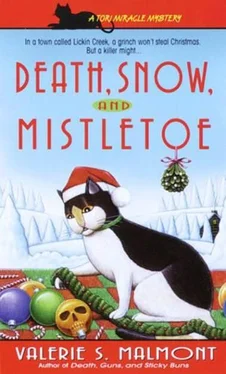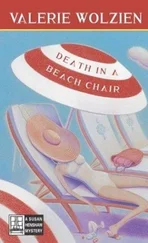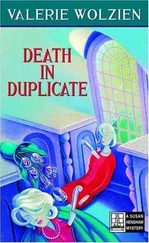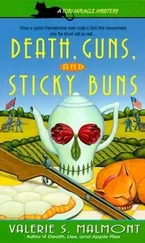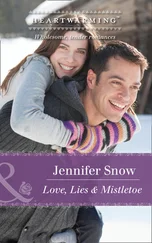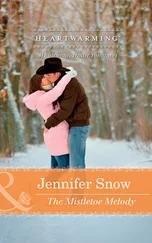“They aren't. Anyone can open a stand there. I think it's only in Lancaster that all the farmers are Amish-or at least appear to be.”
“As long as you're going to a market, I have a little shopping list.” Praxythea handed me a hundred-dollar bill and a list about a yard long. “Thought I'd make a fruitcake. I've got an old family recipe that's just wonderful. Do you think this will cover it?” she asked.
“You could make one out of solid gold for this much money.”
The antique school clock on the wall chimed the hour, reminding me I had a lot to do today. I jammed the list and money into my fanny pack, swallowed the last of my coffee, said good-bye, and rushed out.
Although the Farmers’ Market was open Thursday through Saturday every week of the year, the day to shop was Thursday, when the produce and baked goods were the freshest and the crowds the smallest. Outside the market, several beautiful horses, tied to buggies, waited patiently for their owners. I'd heard that the Amish often bought retired trotting racehorses. These looked hearty enough to still be in competition.
I parked my truck next to a black car, stripped of its chrome, which meant it probably belonged to a Menno-nite family. I had trouble recognizing the differences between the various groups of Plain People in the valley, and the only distinction I was sure of was that the Men-nonites drove cars while the Amish used buggies.
Plywood covered the window openings of the dilapidated brick building, and the wood canopy over the entrance was in danger of collapsing, somewhat like my own front porch. The first time I'd visited the market in the old railroad roundhouse, I'd been horrified. It reminded me of the primitive markets I'd seen in Asian countries, and I couldn't imagine eating anything that came from it.
But familiarity changes one's perceptions of a place, and now I raced inside without a single negative thought about its sanitary condition.
The vast interior was dimly lit by a few bare lightbulbs hanging from the ceiling. I paused in the open doorway and waited for my eyes to adjust. A young woman in a simple cotton dress, white apron, and starched bonnet looked up from a display of freshly baked bread and smiled at me.
“If you play with a door you'll start a family fight,” she said, then added, “Or give me pneumonia.”
“Sorry.” I stepped inside, and the door banged shut behind me.
“Are you looking for Greta?”
It no longer surprised me when strangers knew who I was. I nodded. “But I need to buy some candied fruit and nuts for a fruitcake first.”
“Aunt Emily has the best.” She pointed to a booth at the back of the room.
I moved down the aisle, through a crowd of Plain People and townsfolk who knew where the best bargains in town could be found. Most of the stalls sold farm products such as cheese, milk, meat, and eggs. Some specialized in yummy-looking baked goods. Others carried odd items for unspecified uses like containers of goose grease, sheep tallow, and rings made from horseshoe nails that some local people swore cured rheumatism.
From Aunt Emily I purchased large bags of candied pineapple and cherries, dates, figs, a pound of pecans, and a dozen brown eggs. She looked askance at Prax-ythea's hundred-dollar bill and only decided to accept it after a lengthy consultation with several women from the next booth.
The sign over Greta's booth said THE FINE SWINE SAUSAGE STAND. It was named after the farm owned by Greta and her late husband, Lucky Carbaugh, who'd had a gruesome accident with a manure spreader last spring. While Greta waited on a customer, I stood to one side and watched her.
Greta was a tall muscular woman, whose face was all interesting planes and angles and deeply etched with wrinkles. Her waist-length gray hair was pulled back into a ponytail and tied with a green silk scarf. As usual, she wore a black T-shirt and long, multicolored skirt of Indian gauze, cinched at the waist by a silver concha belt. She was the last of a generation of flower children; more than an anachronism among the Plain folk of the market, but she still managed to be accepted by them by dint of the Gochenauer family having been in Lickin Creek forever.
When Greta saw me, she uttered an exclamation of pleasure and ran around the counter to hug me. “What a treat to see you, Tori! You look wonderful. And so skinny! Don't you ever eat? Let's grab a cup of coffee and talk.”
I loved Greta for a lot of reasons, and one of them was because she always told me I looked skinny.
She led the way to the nearby Koffee Korner and showed me which redwood picnic table to claim. “I can watch my booth from there,” she said. She stood in line at the window and came back in a few minutes carrying two sticky buns, hot from the oven and smelling of cinnamon, and two Styrofoam cups of coffee.
The white cup reminded me of last night and Bernice's death. I couldn't drink from it. Greta sipped her coffee with no problem, but, I reminded myself, she hadn't been there.
We chatted for a few minutes until she asked what I'd heard from Garnet. I really wanted to ask her how many letters she had received, but didn't, because that would mean I'd have to admit I'd had none. So I switched the subject to the real reason I was here-finding out who had a motive to kill Bernice Roadcap.
Greta spilled coffee down the front of her T-shirt. “You think Bernice was murdered?”
Was she putting me on? Greta usually knew about everything that went on in town-often, it seemed, even before the people involved were aware something had happened to them.
A voice behind me screeched, “Did I hear you say Bernice was murdered? Impossible. Now, if it had been Oretta, I'd understand.”
I swiveled to see who it was. I didn't recall ever having seen the pudgy gentleman in a stained artist's smock and beret who had pushed his way into our conversation. He was Hollywood's idea of an artist, I thought, right out of a forties movie.
“Why do you say that?” I asked him.
“Oh, my dear, that Oretta is such a bitch!” He pulled a chair over from the next table and sat without being invited. “Greta, why don't you introduce me to your lovely friend?”
Greta rolled her eyes so only I could see. “Tori, this is Raymond… uh, Raymond… Zook.”
“ Raymond alone is just fine,” he said, accenting the second syllable of his name. “You two charming ladies seem to be having such fun with your gossip session. I hope you don't mind my joining you.”
His snide reference implied we were just a couple of silly women exchanging neighborhood news over our morning coffee. His attitude irritated me, because I was only tapping into the Lickin Creek Grapevine in order to solve a crime-serious business, hardly a gossip session!
Because his lips were hidden beneath a handlebar moustache, I couldn't see them move as he said, “The line of people who'd like to see Oretta dead forms behind me.” His eyes sparkled.
“What do you have against Oretta?” I asked.
“It's more like what Oretta has against me. Why, the woman actually had me arrested once. She called your brother, Greta, and insisted he raid my studio. He and Luscious kidnapped my darlings and took them to that hellhole she calls a shelter.”
“I heard about that,” Greta said. “Something about abusing cats you got from the shelter, wasn't it?”
He placed a soft white hand over his heart. “I have never-I repeat, never-abused a cat.”
Up till then, I'd been totally confused by their conversation. But when I heard mention of cats, I perked up. There's nothing I enjoy more than talking about cats. “You're a cat lover? So am I. I have two. Fred and Noel. Noel's the quiet one, but Fred's quite a show-off.”
“He's something of an artist, too,” Greta said, laughing. “Didn't you tell me he tracked paint all over your apartment last year when you had it redecorated?”
Читать дальше
